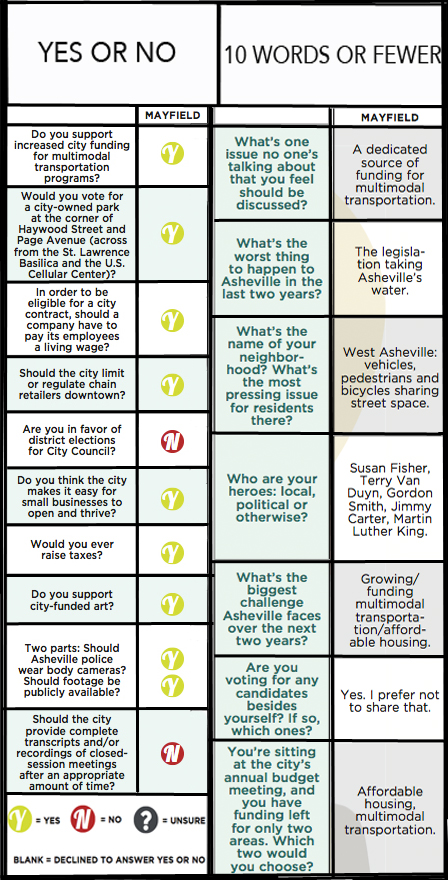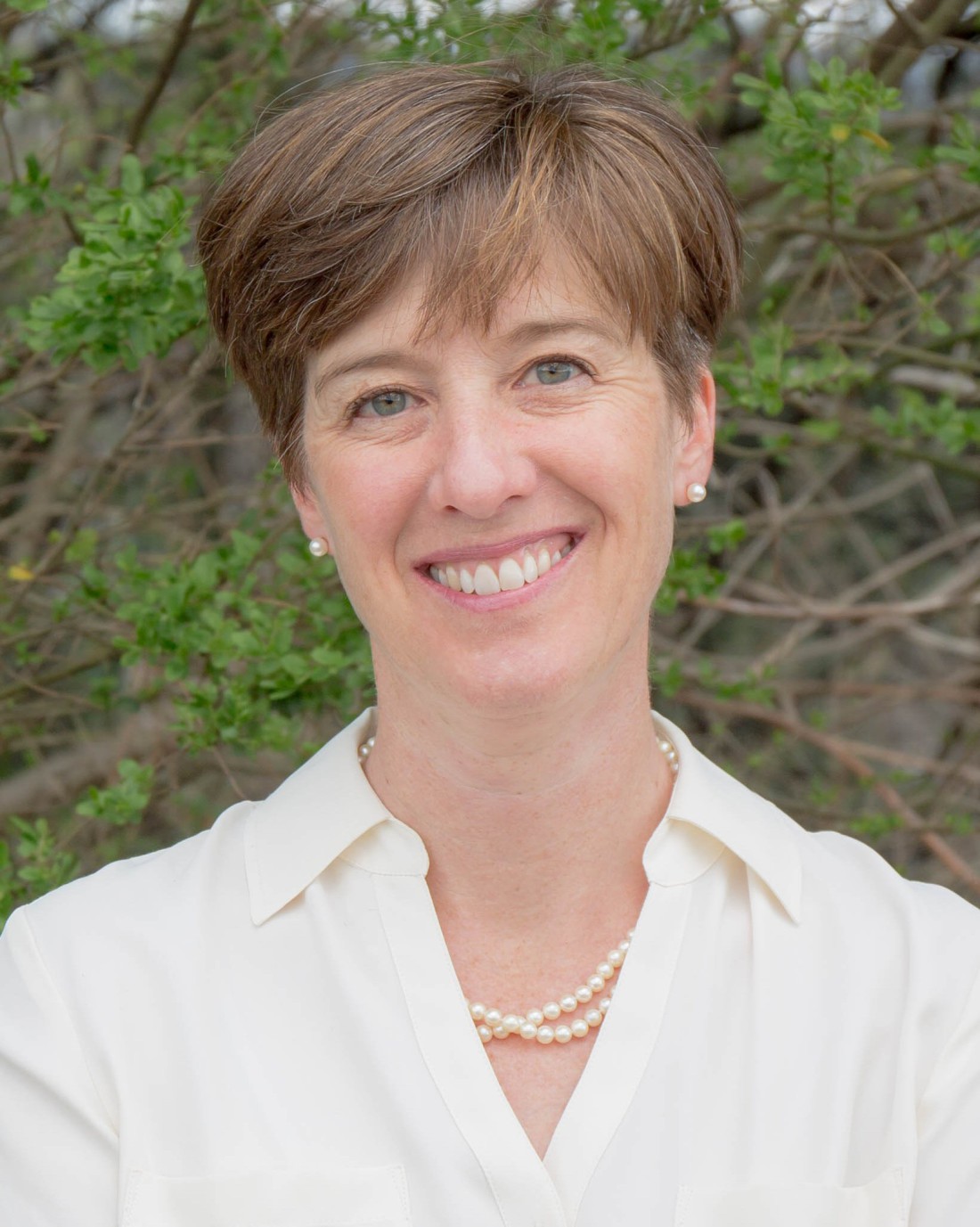Julie Mayfield
- Website: juliemayfieldforcouncil.org
- Employment: Co-director of MountainTrue
- Party affiliation: Democrat
- NEW! Notable endorsements: Sierra Club, Equality NC, state Sen. Terry Van Duyn, state Rep. Susan Fisher, state Rep. John Ager, Council member Chris Pelly, Council member Gordon Smith, Commissioner Brownie Newman, school board member Cindy McMahon, Register of Deeds Drew Reisinger, Adam Charnack of Hi-Wire Brewing, Roger Derrough of Green Sage Café, Sara Day Evans of Prosperity Collective and Accelerating Appalachia, Mike Figura of Mosaic Realty, Jody Goukas of JAG and Associates Construction, Rosanne Kiely of West Village Market and Deli, Peter Krull of Krull & Company, Bill Medlin of Legacy Paddle Sports, Mike Miller of Town and Mountain Realty, Randy Talley of Green Sage Café, DeWayne Barton and Safi Mahaba, Robert Deutsch, Jennie Eblen, Frank Goldsmith, Lael Gray, Tyrone Greenlee, Je’Wana Grier-McEachin, the Rev. Robert Johnson and Julie Johnson, David King and Nancy Waldrop, Jane and David Whilden, and Al Whitesides.
- NEW! Campaign contributions: $28,155.09
- NEW! Campaign expenditures: $22,358.83
NEW! You’re running for office in the midst of a growth spurt in Asheville. What infrastructure needs will you prioritize if elected?
My priorities for infrastructure improvement would be our transportation system: sidewalks, transit, greenways, bike lanes, traffic calming and repaving. These investments make our city more affordable, healthier and improve the quality of life for everyone. The city has limited options for raising new funds — property and sales taxes and fees — and we need to determine which of these makes the most sense and what level we are willing to tolerate to improve Asheville. Our growth alone will provide more tax revenue, but to address these long-term and long-standing needs, I believe we need a dedicated source of revenue that will allow the city to meet these needs predictably and methodically. It would be premature to state what the city should do. That decision should come only after an extended community conversation.
NEW! How do you think City Council should proceed in regard to short-term rentals and homestays?
I support the continued ban on “whole house” STRs in residential areas and the increased fine for violations. I also support loosening the rules for homestays to allow people who live here to generate income from their home but in a way that discourages predatory investors.
NEW! What can and will you do to address inequality in Asheville?
The answer to this question addresses several levels of this complex issue. Access to opportunity is fundamental to addressing this problem, so I would advocate for infrastructure improvements, such as expanding transit, building more sidewalks and rebuilding our public housing developments, so that poor communities of color have quality places to live and an easier time getting around and accessing opportunity. I would also champion an effort to connect our economic development efforts with A-B Tech and our low-income communities to ensure those communities are being connected to new job and educational opportunities. And I would also seek to launch a reconciliation initiative that would acknowledge African-American history in Asheville, from pre-Civil War to urban renewal, and create permanent reminders (markers, monuments, photographs) of those events and sacrifices.
NEW! What can you bring to City Council that other candidates can’t or don’t?
I bring 25 years as a public-interest attorney and advocate, working both inside and outside of government, advocating on Asheville’s critical issues: land use, transportation and the environment. I understand how policymaking and government work; I bring experience working at the local, state and federal levels; and I have good relationships with virtually all of the WNC state and federal delegations. As a public-interest advocate, I also bring a unique understanding of the importance of inclusive decision-making, fairness and justice, and I know how to create decision-making processes to enable people to provide effective input. A hallmark of my work has been to build partnerships and coalitions — frequently with people across the aisle — to get things done. This is critically important given the diverse politics in the region and the state. I honestly believe my entire career has been preparing me for a leadership role in Asheville today.
What are three achievable goals that you would champion in the next two years?
Revising the comprehensive plan and the Unified Development Ordinance to update it with the best strategies around smart growth and increasing density in appropriate areas. Asheville can’t grow out, so we need to grow in and up. And we need to do that in the best and smartest way possible. No. 2, fully funding the Affordable Housing Trust Fund. And No. 3, achieving some measure of consensus around how we are going to fund multimodal transportation improvements.
What are the best strategies for increasing affordable housing in Asheville?
Fully funding the Affordable Housing Trust Fund. The city owns a fair amount of land that is arguably underutilized now and is well-positioned to be used for affordable housing. The city just adopted a density bonus in December: Look at that and see if it’s doing what we want it to do. Maybe even increasing that: I’ve heard some people say we could be even more aggressive on the density bonus.
What is one recent City Council decision you don’t agree with, and how would you have handled it differently?
They approved an apartment complex on Sardis Road recently. The site straddles the city-county line, and the city was considering the units that would be on its side. The staff recommended against approval. One reason was that it didn’t meet the fire safety recommendations, because the complex had only one ingress and egress. Chief Burnett stood up at the City Council meeting and voiced his concerns. Council approved it, and I understand their reasons, but I would have found it difficult to ignore the fire chief. I would have wanted a discussion around the alternatives.
What makes Asheville home for you?
I love the scale of Asheville in terms of walkability. It’s hard to walk across town without seeing somebody you know. Because of its size, it’s also very easy to get involved. We moved here from Atlanta in 2009, and about a year later I was on the Transit Committee and my husband was on the Greenways Committee. This is a town that opens its arms to people who want to get involved, and I love that.
Do you support expanding the tourism industry, or should we focus on other areas of economic development? Or do you think government shouldn’t play a role?
Government should play a role, there’s no question. There was an intentional decision to create this TDA fund for advertising to bring people here. I think Asheville is on the map in a way that it hasn’t been before, and we probably don’t need to be tooting our horn as much as we have. In other industries, I think this city can promote itself as an attractive place. We might look at suppliers for some of the industries that are already here: medical suppliers, outdoor gear suppliers, beer suppliers, art supply companies. Look at the big industries we have here and try to bring the support businesses to help make them successful.
A recent study showed that Buncombe County had lower growth in middle-class jobs than other areas. What can the city do to address this?
The city, as a stand-alone entity, has very little influence on economic development and attracting new companies. The city as part of the Economic Development Coalition, working with the Chamber and the county, obviously has a bigger role. I think the EDC’s focus should be targeting employers that are going to bring jobs that pay good wages but don’t require an advanced degree. Look at companies that make things that other companies use, to try and pull in those middle-wage jobs.
With Asheville growing so fast and several new hotels being built downtown, how do you plan to address the inevitable traffic problems on city streets and I-240?
The first thing for me, always, is investing in multimodal transportation. Let’s make it easier for people to get out of their cars. Absolute No. 1 is to build out a system that allows people to do that or to have one car instead of two. I think if we made the investments in that system, even a fraction of the amount that the Department of Transportation is planning to spend on the I-26 connector project, we’d be golden.




Before you comment
The comments section is here to provide a platform for civil dialogue on the issues we face together as a local community. Xpress is committed to offering this platform for all voices, but when the tone of the discussion gets nasty or strays off topic, we believe many people choose not to participate. Xpress editors are determined to moderate comments to ensure a constructive interchange is maintained. All comments judged not to be in keeping with the spirit of civil discourse will be removed and repeat violators will be banned. See here for our terms of service. Thank you for being part of this effort to promote respectful discussion.